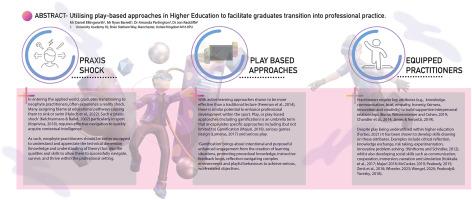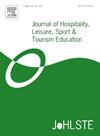Utilising play-based approaches in higher education to facilitate graduates transition into professional practice
IF 4.1
2区 教育学
Q1 EDUCATION & EDUCATIONAL RESEARCH
Journal of Hospitality Leisure Sport & Tourism Education
Pub Date : 2025-05-22
DOI:10.1016/j.jhlste.2025.100557
引用次数: 0
Abstract
In entering the applied world, graduates transitioning to neophyte practitioners, often experience a reality shock. Many assigning blame at educational pathways causing them to sink or swim (Haluch et al., 2022). Particularly in sport, such a praxis shock requires effective navigation to acquire contextual intelligence. In response, there is the potential for the transfer of active learning approaches from higher education to the professional development of sport practitioners. Particularly gamification brings about an opportunity to provide intentional and purposeful engagement, promoting procedural knowledge, instructive feedback loops, reflection and navigating complex environments to achieve serious work-related objectives. Often, these opportunities provide chance to practice critical reflection, knowledge exchange, risk taking, experimentation and innovative problem-solving (Hinthorne and Schneider, 2012). In turn, developing key attributes (i.e., cooperation, trust, innovation, simulation) required as sport professionals. In response, we present some considerations within the umbrella of play-based approaches, including serious play, and serious games design as andragogical approaches to aid professional development for neophyte practitioners. These include reflective practice considerations, adapting to learners needs, ensuring facilitation, and creating a psychologically safe environment – principles akin to key andragogical principles.

在高等教育中运用以游戏为基础的方法,促进毕业生向专业实践过渡
在进入应用领域时,毕业生向新手从业者过渡,往往会经历现实的冲击。许多人将责任归咎于导致他们沉沦或游泳的教育途径(Haluch等人,2022)。尤其是在体育运动中,这样的实践冲击需要有效的导航来获得情境智能。作为回应,有可能将主动学习方法从高等教育转移到体育从业者的专业发展中。特别是游戏化带来了一个机会,提供有意和有目的的参与,促进程序性知识,指导性反馈循环,反思和导航复杂的环境,以实现严肃的工作相关目标。通常,这些机会提供了实践批判性反思、知识交流、冒险、实验和创新解决问题的机会(Hinthorne和Schneider, 2012)。反过来,发展关键属性(即,合作,信任,创新,模拟)需要作为体育专业人士。作为回应,我们在基于游戏的方法中提出了一些考虑,包括严肃游戏和严肃游戏设计,作为帮助新手从业者专业发展的方法。这些原则包括反思性练习考虑、适应学习者的需要、确保促进和创造心理安全的环境——这些原则类似于关键的哲学原则。
本文章由计算机程序翻译,如有差异,请以英文原文为准。
求助全文
约1分钟内获得全文
求助全文
来源期刊
CiteScore
8.10
自引率
10.80%
发文量
41
审稿时长
42 days
期刊介绍:
The Journal of Hospitality, Leisure, Sport and Tourism Education (JoHLSTE) is the leading international, peer-reviewed educational journal for this subject grouping. Its aims are to: a) Promote, enhance and disseminate research, good practice and innovation in all aspects of higher education in Hospitality, Leisure, Sport and Tourism and Events to its prime audience including teachers, researchers, employers, and policy makers. b) Encourage greater understanding, links and collaboration across its constituent fields. JoHLSTE is designed to have maximum impact through it being available on-line, fully archived and peer-reviewed. JoHLSTE is divided into seven sections: Editorial; Academic Papers; Practice Papers, Perspectives, Comments and Rejoinders, Research Notes and Reports and Education Resource Reviews.

 求助内容:
求助内容: 应助结果提醒方式:
应助结果提醒方式:


